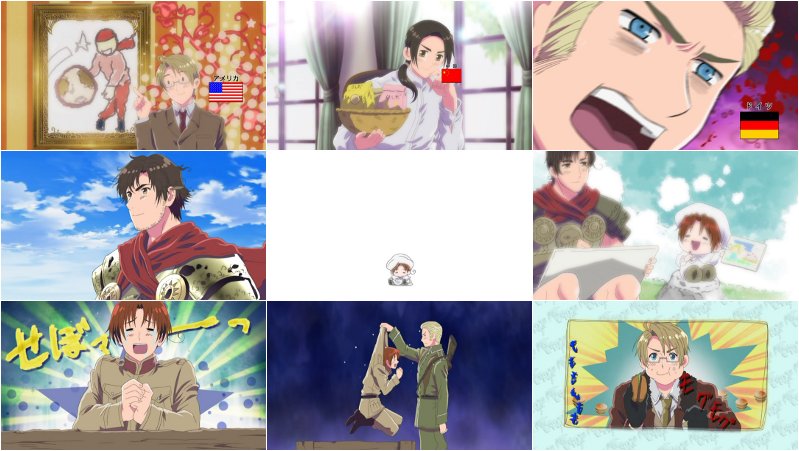
This was, of course, a show I had thoroughly PSHAW’D when it first appeared. Anthropomorphised countries? WWII? It sounded like a dreadful idea.
However, while writing the piece on Wonderful, I decided I ought to check out the big modern gag anime that I hadn’t already seen. Namely, Lucky Star, K-On and Hetalia. While Lucky Star and K-On don’t really work for me in the form they are in, I was pleasantly surprised to find myself enjoying Hetalia.
Despite what the loudest, most obnoxious parts of its fandom might suggest to you, it works on a variety of levels, not just that of pretty boys in uniforms. In fact, the pandering innuendo is probably the weakest aspect of its humour, which unfortunately becomes more of a crutch for the series than is in evidence during this first batch of episodes.
What the show is strongest on is the historical humour, often delivering jokes that are arguably too clever for their own good, due to their reliance on very specific historical and cultural events (what other anime is making Busby Stoop Chair gags?). I’m a big fan of overly specific humour and parody, but I can see how the need to research the history to get some of the jokes would be off putting. And to it’s credit it doesn’t overuse them, often using them a starting point, spinning the humour off the historical reference by using it’s main comedic weapon.
Namely, national stereotypes.
Now there certainly is the potential to be truly offensive here, and it’s easy to assume it would be by the description. Or indeed the name. However, from my point of view, it’s no more offensive than ‘Allo, ‘Allo and it’s probably about the geopolitics of WW2 to the same extent as that erstwhile British sitcom. Of course people complained about ‘Allo ‘Allo, so it’s not surprising that Hetalia has its critics too.
Where the series mainly confines its use of anthropomorphic geopolitics is in the non-WW2 sections, particularly the Chibitalia segments set during the Holy Roman Empire. The WW2 era is wisely left more for the broadest gags based on national stereotypes. Because some of those gags are very broad, it’s worth avoiding watching too many episodes in a row. There’s only so many jokes about Italy being obsessed with food and surrendering you can watch in one sitting, even if they are interspersed with sketches about historical border changes in Central Europe.
The writing is so all over the place and the animation functional but consistent, that it won’t rank up there with all time classic gag anime, but it’s not as dumb as it looks on the surface. Well, OK, it is that dumb sometimes, but it’s also too clever for its own good at other times. And the timing and editing is very good, light years ahead of the likes of Lucky Star and K-On.